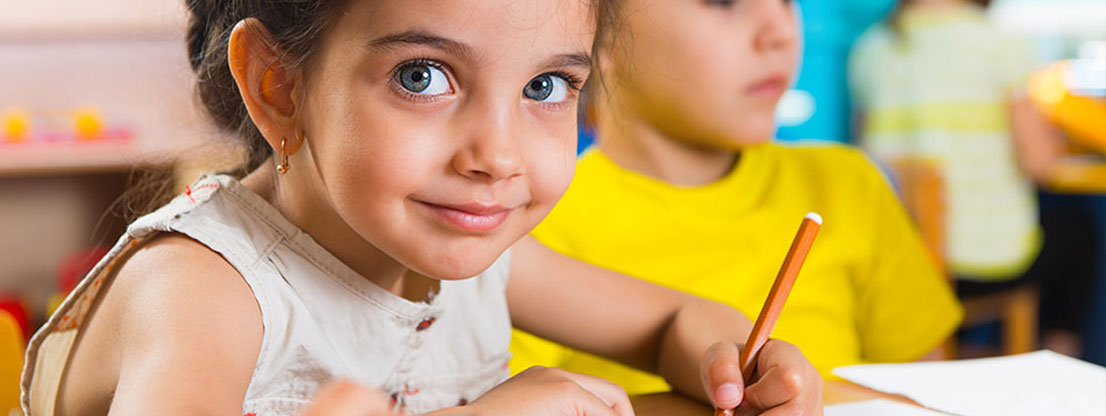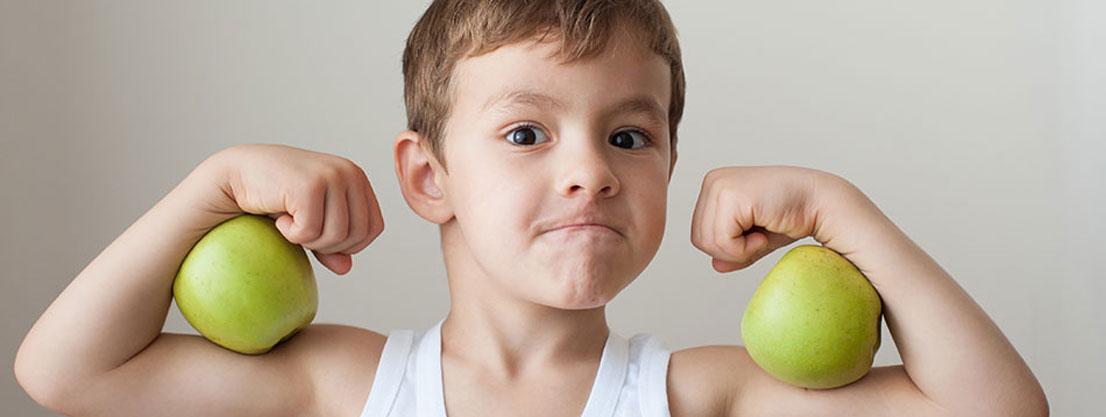ADHD prevention without medication
For more concentration from childhood on
One of the most common sentences – which we usually don’t even think about – is: “Concentrate now! But this statement is not as banal as it may seem at first glance: Concentration is actually something that is not innate in humans by nature. If you observe an infant, you will see that it is not yet able to focus its attention on a single point for a long time. The older the child gets, the more you practice sitting still and concentrating on one thing with him. Particularly at primary school age, it is a challenge for most children – even healthy ones – to sit at the table for long periods of time in a concentrated and calm manner. Those who suffer from the so-called attention deficit hyperactivity disorder “ADHD” are particularly severely affected. What does it mean for a child not to be able to concentrate on one thing? And how can one promote and train childhood concentration?

This is how children with ADHD feel: Like remote-controlled – but without intention
For people who are not suffering from ADHD, it is often strange to be confronted with affected children. Because they sometimes do not manage to just sitting quietly in one place and have a lot of desire to move. Children with ADHD often stand out in society because of their impulsiveness and increased willingness to deal with conflict. Others lose themselves in unpointed, highly detailed and unstructured narratives. In addition, those affected are distracted by environmental factors that are insignificant for “normal people”.
For you as an outsider, it can sometimes seem as if the people who are suffering from the syndrome do not want to concentrate at all. But in reality their brain prioritises things that are irrelevant to you as important and interesting to them. So they can’t really decide, like you can, which things they want to pay attention to. [1]
1. Improving children’s concentration

Explain life in metaphors and narratives
When you look at children’s books, you notice that there are many more pictures than texts in them. This is because children are much more receptive to pictures than to text alone. If you use situational associations to learn and explain something – for example, by making up a nice story to help the child remember what to put in his or her school bag – your efforts will bear fruit more quickly. Especially if you repeat the story regularly in the same order. [2]
Rituals and fixed procedures are sacred
Children will often have difficulties in creating their own structure and then concentrating on these activities in the right order. They have to learn this independence step by step with the help of their parents. It is therefore essential for children to have very fixed rituals and sequences, because repetitions and structures are important for developing a stable ability to concentrate. [3]
Regularly and playfully
Whatever happens at the same time, children can memorise much better. You can practise this by brushing your teeth, for example. Set this activity to certain times every day and make the process playful: animal toothbrushes, cool toothpaste and funny stories about brushing teeth can help! In this way, these activities will eventually become normal for children and be accepted by them, even if the process can sometimes be tough and lengthy. The same applies to doing homework, cleaning rooms and all the responsibilities that affect oneself or the environment.
Better attention through sport
Any kind of movement promotes the ability to concentrate. Because through sport and so-called physical education, motor skills, coordination and endurance are trained. As children with ADHD often have difficulties integrating into groups and dealing constructively with criticism, individual activities are often more suitable for them than group sports. Sports with uniform movements have also proved to be particularly suitable. [4]
Good conditions for concentrating on personal tasks
Children should have a tidy and quiet workplace for concentration work, such as homework. Distractions such as television, computer, mobile phone, tablet and the like should be kept away from the place of work and concentration. Some types of music, such as classical music, can improve your ability to concentrate. There are many playlists on the internet that have been lovingly compiled. Just letting them run quietly in the background can sometimes work wonders! [5]

Plenty of fresh air – indoors and outdoors
Parents and carers should ensure that the air in the child’s room or workplace always contains sufficient oxygen. If the quantities are too small, the air in the room is enriched with a lot of carbon dioxide, which means that the brain no longer receives sufficient oxygen supply to be fully efficient.
Regular walks in the woods, through parks or green areas also kill two birds with one stone: fresh air combined with exercise. Musical breaks bring a breath of fresh air to the mind – after which the ability to concentrate is usually significantly increased again!
A safe surroundings and a lot of attention create emotional stability
A very important factor in building a healthy self-esteem is a stable environment. Children and adolescents with ADHD syndrome let the most banal things upset them. That is why it is especially important for them that people in their immediate environment give them a lot of recognition and love. This makes it easier for children suffering from this syndrome to develop more emotional stability. [6]
2. Two major risk factors – and how you can eliminate them

The digital revolution – permanently online without switching off
In the process of the digital revolution and global networking, new developments are constantly coming onto the market, the excessive use of which makes it more difficult for children to develop a healthy ability to concentrate. Filtering, differentiation and classification of stimuli is especially difficult for children who have not yet completed their 13th year of life. Children and young people need time to process the newly acquired information. Parents and guardians should therefore pay particular attention to ensuring that young people are not exposed to too many impressions too often and have sufficient periods of rest and sleep. [7]
Do not promote individual talents – If children are to become what others would like them to be
Children have to work hard at school: a maths test on Monday, daily homework and maybe even a club membership or a musical instrument. Not every child is able to cope with this pressure to perform and expectations. Overworking often leads to imbalance, lack of concentration and an aggressive, negative attitude in children and young people. And: Not every child is a maths super brain. But that does not mean that they do not have talents. The following applies here: individual recognition of needs and promotion of one’s own innate talents and abilities – even Goethe would probably have failed in astrophysics. Parents and educators as well as teachers should therefore definitely promote children according to their individual abilities. [8]
3. Tips for your everyday life – boost your concentration

As you have read now, many causes can lead to concentration problems. You can take preventative measures – this applies to all ages. However, if you have already been diagnosed with an illness, you should definitely seek professional advice and treatment from a specialist doctor. Reading tip: Improve concentration despite information overload.
As a preventative measure, adults and guardians can follow these tips for their children
- Eat a healthy diet: Fresh fruit and vegetables, nuts and wholesome food provide the brain and body with healthy nutrients – it’s not called vital food for nothing!
- Drink enough water and herbal teas or thin juice spritzers – at least two to three litres a day. This will also prevent headaches caused by dehydration.
- Exercise regularly: It doesn’t have to be a marathon. Yoga, walks, swimming and other activities that you really enjoy have a positive effect on your physical and mental wellbeing.
- Get enough restful sleep: Regeneration and rest are essential for sufficient concentration!
- For adults: Prevent stress, keep your schedule clear and take time for walks, meditation, sauna and wellness. [9]
Make sound journeys with the sonamedic frequency therapy
The sonamedic frequency therapy offers you the possibility to relax quickly and easily and to be able to concentrate better. All you need is about ten minutes of your time, your smartphone and headphones. Make yourself comfortable somewhere and choose the right sound journey for you from our concentration section. Enjoy the soft – but very positive – effects of the combination of binaural beats, relaxation music and optional positive suggestions and strong images from our speakers. Just give it a try – sonamedic works without any risks and side effects.
Scientific sources
1) Updated European Consensus Statement on diagnosis and treatment of adult ADHD European Psychiatry 56 (2019) S. 14 – 34.
2) Konzentration und Aufmerksamkeit fördern. auf: mit Kindern lernen.ch Online (Zugriff am 08.07.19)
3) Sarah Jane Steiner: Förderung der Konzentrationsfähigkeit bei Kindern mit Entwicklungsverzögerungen im Vorschulalter Online (Zugriff am 07.07.19)
4) Leithäuser R., Beneke R: Sport bei ADHS – Plan für Desaster oder verschenkte Ressourcen? in: Deutsche Zeitschrift für Sportmedizin, Jahrgang 64, Nr.10 (2013) S.287 – 292.
5) Sich konzentrieren können. Konzentration lernen. auf schulpsychologie.de Online (Zugriff am 07.07.19)
6) Dr. Helga Simchen: AD(H)S und Hochbegabung – eine Balance zwischen hohem Selbstanspruch und ständiger Enttäuschung. auf: ADHS Deutschland e.V. Online (Zugriff am 08.07.19)
7) Maria Limbourg: Entwicklungspsychologische Voraussetzungen für das sicherheitsorientierte Verhalten von Kindern. Universität GH Essen. Online (Zugriff am 07.07.19)
8) Konzentrationsstörungen auf: Kinder- und Jugendärzte im Netz Online (Zugriff am 08.07.19)
9) Die Ursachen für Konzentrationsstörungen sind vielfältig auf: PraxisVita.de Online (Zugriff am 08.07.19)




